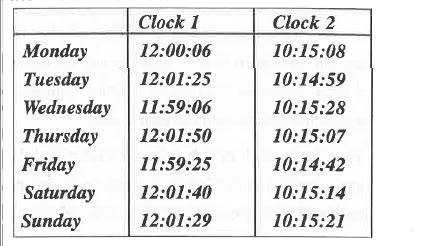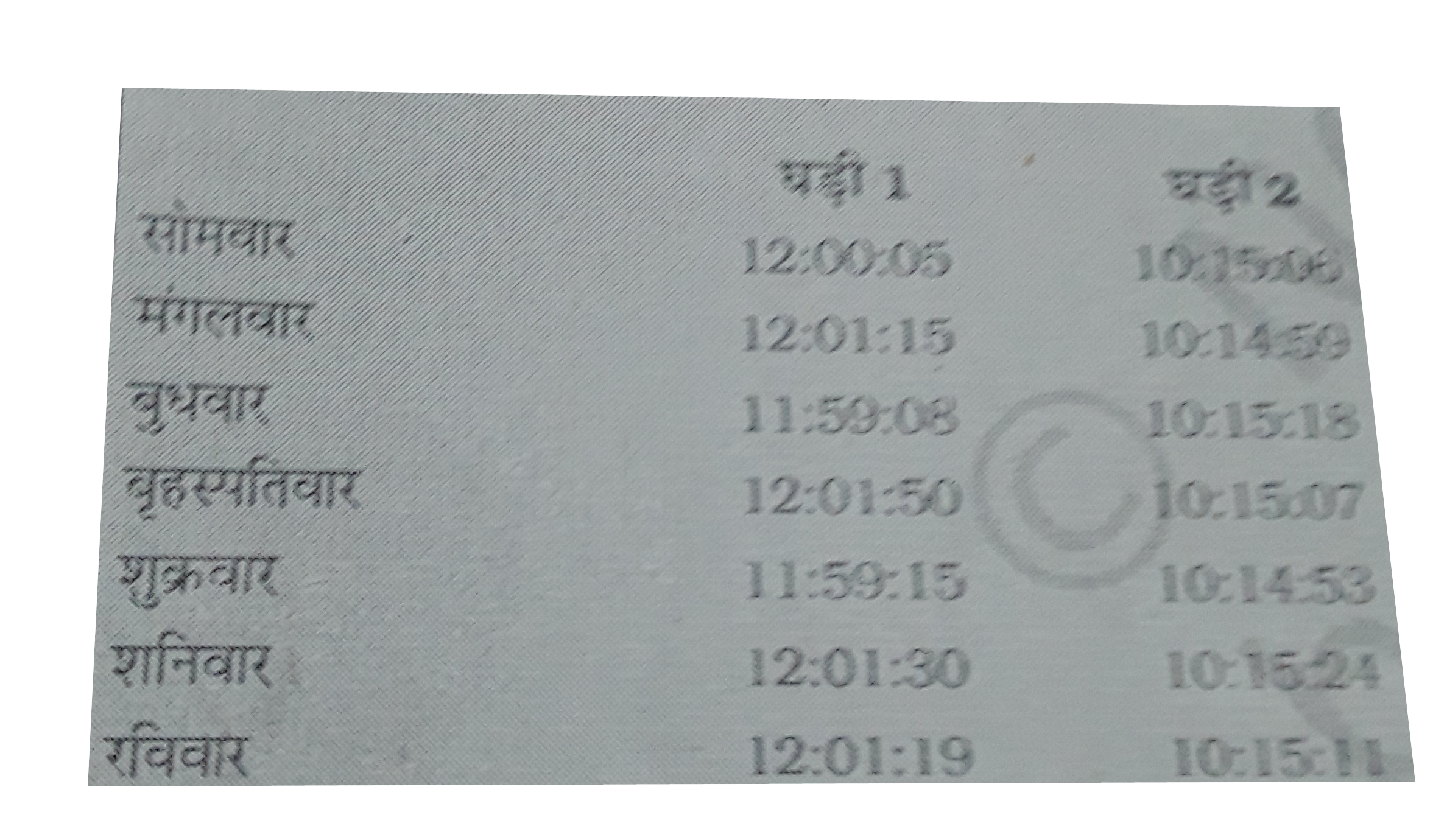Two clocks are being tested against standard clock a located in a national laboratory. At 12:00:00 noon by the standard clock the readings of two clocks are given as follows.Clock IClock IIMonday12:00:0510:15:06Tuesday12:01:1510:14:59Wednesday11:59:0810:15:18Thursday12:01:5010:15:07Friday11:59:1510:14:53Saturday12:01:3010:15:24Sunday12:01:1910:15:11If you are doing an experiment that requires precision time interval measurements which of the two clocks will you prefer?a Clock Ib Clock IIc Both have same precision time interval measurementsd None of the above
The correct Answer is:Option b
Correct Option b Clock IIExplanation:A simple look at the data shows that average reading of clock I is much closer to the standard time that average reading of clock II. Therefore zero error in clock II is much larger than the zero error in clock I. But zero error can-always be corrected by applying necessary correction.Now over the seven days range of variation of clock I is 12:01:50 - 11:59:08 = 162 s and range of variation of clock II is 10:15:24 - 10:14:53 = 31 s. Therefore precision of clock ll is much better than the precision of clock I. We will prefer clock II.
Related Solutions
Two clocks are being tested against a standard clock located in a national laboratory. At 12:00:00 noon by the standard clock, the readings of the two clocks are :
If you are doing an experiment that requires precision time interval measurements, which of the two clocks will you prefer ?
View SolutionTwo clocks are being tested against a standard clock located in a national laboratory. At 12:00:00 noon by the standard clock, the readings of the two clocks are :
If you are doing an experiment that requires precision time interval measurements, which of the two clocks will you prefer? The range of variation in time of clock ?
View SolutionTwo clocks are being tested against a standard clock located in a national laboratory. At 12:00:00 noon by the standard clock , the readings of the two clocks are :

If you are doing an experiment that requires 'precision time interval' measurements, which of the two clocks will you prefer? c
View SolutionTwo clocks are being tested against a standard clock located in a national laboratory. At 12 : 00 : 00 noon by the standard clock, the readings of the two clocks are : If you are doing an experiment that requires 'precision time interval' measurements, which of the two clocks will you prefer ?
View SolutionTwo clocks are being tested against a standard clock located in a national laboratory. At 12:00:00 noon by the standard clock , the readings of the two clocks are : If you are doing an experiment that requires 'precision time interval' measurements, which of the two clocks will you prefer? c
View SolutionTwo clocks are being tested against a standard clock located in a national laboratory. At 12:00:00 noon by the standard clock, the readings of the two clocks are : If you are doing an experiment that requires 'precision time interval' measurements , which of the two clocks will you prefer ?
View SolutionTwo clocks are being tested against a standard clock located in a national laboratory. At 12:00:00 noon by the standard clock, the readings of the two clocks are : If you are doing an experiment that requires 'precision time interval' measurements , which of the two clocks will you prefer ?
View SolutionTwo clocks are being tested against a standard clock located in a national laboratory. At 12:00:00 noon by the standard clock, the readings of the two clocks are : {:(,"Clock1", "Clock 2"),("Monday",12:00:05:,10:15:06),("Tuesday",12:01:15,10:14:18),("Wednesday",11:59:08,10:15:18),("Thursday",12:01:50,10:15:07),("Friday",11:59:15,10:14:53),("Saturday",12:01:30,10:15:24),("Sunday",12:01:19,10:15:11), ("Sunday",12:01:19,10:15:11):} If you are doing an experiment that requires precision time interval measurements, which of the two clocks will you prefer? The range of variation in time of clock ?
View SolutionTwo clocks are being tested against a standard clock located in a national laboratory . At 12:00:00 noon by the standard clock, the regarding of the two clocks are : If you are doing an experiment that requires precision time interval measurements, which of the two clocks will you prefer ?
View SolutionTwo clocks are being tested against a standard clock located in a national laboratory . At 12:00:00 noon by the standard clock, the regarding of the two clocks are : If you are doing an experiment that requires precision time interval measurements, which of the two clocks will you prefer ?
View SolutionTwo clocks are being tested against a standard clock located in a national laboratory . At 12:00:00 noon by the standard clock, the regarding of the two clocks are : If you are doing an experiment that requires precision time interval measurements, which of the two clocks will you prefer ?
View SolutionTwo clocks are being tested against a standard clock located in a national laboratory .At 12:00:00 noon by the standard clock, the readings of the two clocks are {:(,"Day 1","Day 2","Day 3","Day 4" , "Day 5"),("Clock 1",12:00:04,12:02:19,12:01:50,11:59:04,11:59:08),("Clock 2",11:15:24,11:15:01,11:14:59,11:15:00,11:14:58):} Which of the two clocks will you prefer to measure the time intervals during an experiment ?
View SolutionTwo clocks are being tested against a standard clock located in a national laboratory .At 12:00:00 noon by the standard clock, the readings of the two clocks are
Which of the two clocks will you prefer to measure the time intervals during an experiment ?
View SolutionTwo clocks and being tested against a standard clock located in the national laboratory At AM by the standard clock, the readings of the two clocks are shown in following table
If you are doing an experiment that requires precision time interval measurements, which of the two clocks will you prefer ?
View SolutionTwo clocks A and B being tested against a standard clock located in the national laboratory At 10.00 AM by the standard clock, the readings of the two clocks are shown in following table {:("Day","Clock A","Clock B"),(I^("st"),10:00:06,8:15:00),(II^("nd"),10:01:13,8:15:0.1),(III^("rd"),9:59:0.8,8:15:04),(IV^("th"),10:02:15,8:14:58),(V^("th"),9:58:10,8:15:02):} If you are doing an experiment that requires precision time interval measurements, which of the two clocks will you prefer ?
View SolutionTwo clocks A and B being tested against a standard clock located in the national laboratory At 10.00 AM by the standard clock, the readings of the two clocks are shown in following table {:("Day","Clock A","Clock B"),(I^("st"),10:00:06,8:15:00),(II^("nd"),10:01:13,8:15:0.1),(III^("rd"),9:59:0.8,8:15:04),(IV^("th"),10:02:15,8:14:58),(V^("th"),9:58:10,8:15:02):} If you are doing an experiment that requires precision time interval measurements, which of the two clocks will you prefer ?
View Solutionराष्ट्रीय प्रयोगशाला में स्थित एक मानक घड़ी से तुलना करके दो घड़ियों की जाँच की जा रही है | मानक घड़ी जब दोपहर के 12 : 00 : 00 का समय दर्शाती है, तो इन दो घड़ियों के पाठ्यांक इस प्रकार हैं-
यदि आप कोई ऐसा प्रयोग कर रहे हो जिसके लिए आपको परिशुद्ध समय अंतराल मापन की आवश्यकता है, तो इनमें से आप किस घड़ी को वरीयता देंगे ? क्यों
View SolutionTwo clocks Aand B are being tested against a standard clock located in the national laboratory. At 10.00 AM If you are doing an experiment that requires precision time interval measurements, which of the two clocks will you prefer?
View Solutionराष्ट्रीय प्रयोगशाला में स्थित एक मानक घड़ी से तुलना करके दो घड़ियों की जाँच की जा रही है । मानक घड़ी जब दोपहर के 12:00:00 का समय दर्शाती है, तो इन दो घड़ियों के पाठ्यांक इस प्रकार है :

यदि आप कोई ऐसा प्रयोग कर रहे हो जिसके लिए आपको परिशुद्ध समय अंतराल मापन की आवश्यकता है, तो इनमें से आप किस घड़ी को वरीयता देंगे ? क्यों ?
View SolutionTwo clocks are being tested against a standard clock located in a national laboratory At 12 : 00 : 00 noon by standard clock, the readins of the two clocks are
From the Observations carefully read the following conclusive statements.
Statement I : Zero - error in clock II is much longer than zero - error in clock I.
Statement II : Zero - error can always be corrected by applying necessary corrective measures
Statement III : Precision of clock - I is more than precision of clock - II
Statement IV : Precision of clock - II is more than precision of clock - I
Pick up the correction option from the following.
View Solution